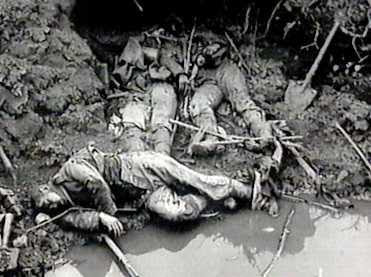Mare’s memory from this evening with Grandpa is consistent with a number of details I collected, previously. Other family members have shared different aspects of this story with me. I have also seen the pocket book Mare refers to. It was in my dad's possession and I remember listening to him tell me why it was stained. Unfortunately, we still have been unable to relocate it.
It is also interesting that more formal sources of information (e.g. WW1 histories, excerpts from soldier's journals, etc.), independently, confirm details contained in Mare's narrative. These include:
- Direct orders (Usually given at the beginning of an attack) that no soldier stop or return to pick up the dead or injured,
- The deplorable and inhumane conditions that existed on the Western Front, and
- The standards of discipline and consequences for soldiers who disobeyed a direct order.
To be fair, many
factors required careful review by a commanding officer before fallen and
injured soldiers could be recovered. One
of the major concerns was whether those recovering the bodies, would also be
killed. However, the loyalty, love, and
compassion for fallen friends, often compelled soldiers to risk their own
lives—from both the enemy and their own commanders— and venturing out into No Man’s
Land. The following examples highlight this
conflict of loyalty:
The British High Command did not allow the rescue of wounded men in the open, in case the rescuers themselves should become wounded. The Australians [ANZAC’s] disobeyed. They could not leave their mates stranded and calling for help. One officer walked across the battlefield and made a truce with the Germans. He even offered himself as a prisoner while his men tried to find all the Australian [ANZAC] wounded. (http://www.anzacday.org.au/history/ww1/overview/west.html)
In similar
fashion, tensions increased around this matter, especially between ANZAC and
British commanders at the Battle of Fromelles.
At the end of this battle, a temporary truce between the German and Allied
troops was agreed upon. This allowed for
both sides to collect their dead and injured from No Man’s Land. Unfortunately, the truce was stopped at the
last minute, by senior British Officers. (http://www.historylearningsite.co.uk/battle_of_fromelles.htm)
Deplorable Conditions
Unfortunately, deplorable conditions
inside and outside of the trenches were the norm for the Western Front. A mixture of limited resources (e.g.
blankets, nutritional food, clean water, etc.), mud filled trenches, and
seasonal changes in the weather, severely disrupted living conditions for
soldiers. The following are six (6)
firsthand accounts, by soldiers, describing their experience on the front line,
in the trenches:
 |
| "...mud, heat, thirst, filth, rats, the sweet smell of corpses, the disgusting smell of excreta and the terrible fear: ‘it seems we will have to attack’, and that when nobody has any strength left." |
 |
| "...mud, heat, thirst, filth, rats, the sweet smell of corpses, the disgusting smell of excreta and the terrible fear: ‘it seems we will have to attack’, and that when nobody has any strength left." |
 |
| "...during the summer months the swarms of flies around the corpses and the stench, that horrible stench. If we had to construct trenches we put garlic cloves in our nostrils." |




No comments:
Post a Comment